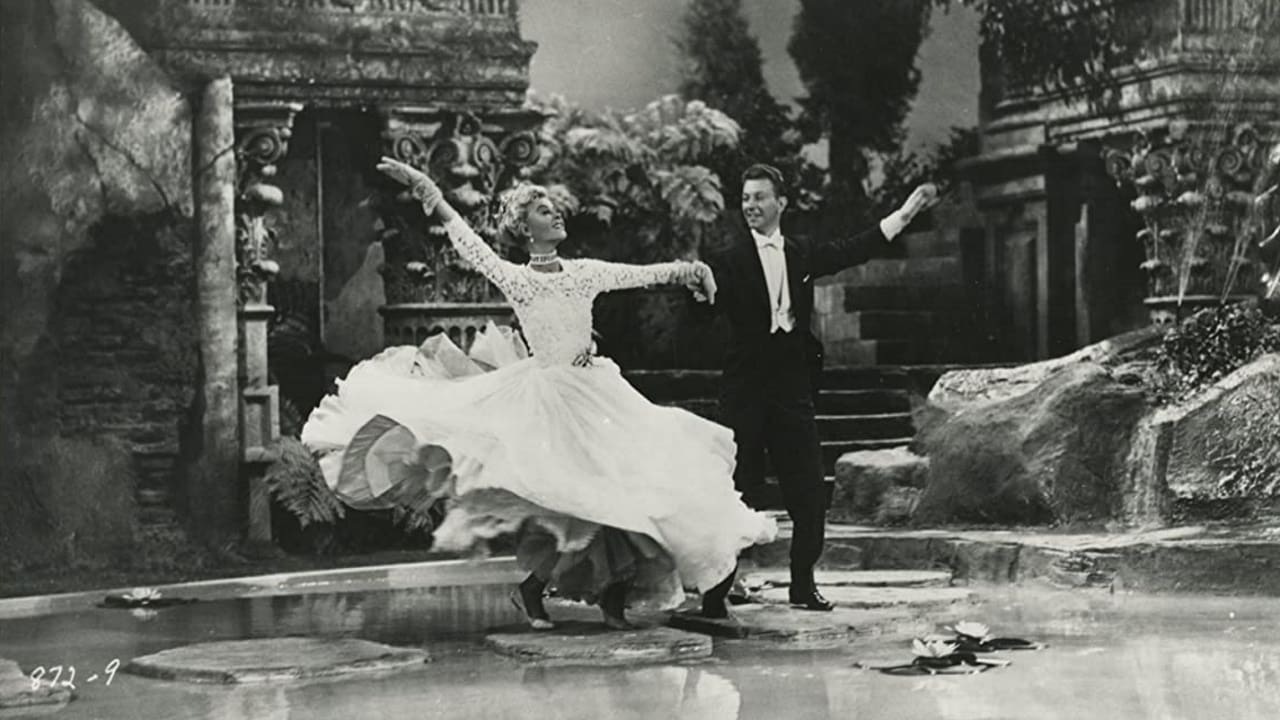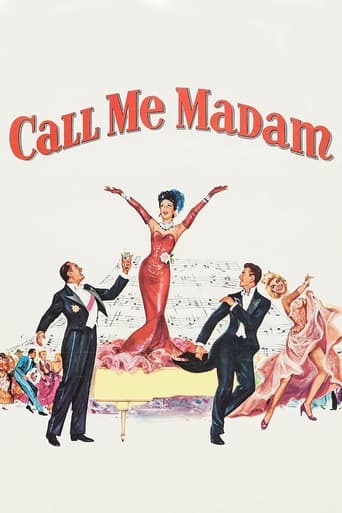Cathardincu
Surprisingly incoherent and boring
TeenzTen
An action-packed slog
Kaydan Christian
A terrific literary drama and character piece that shows how the process of creating art can be seen differently by those doing it and those looking at it from the outside.
Oct
Once upon a time there was a society hostess named Perle Mesta who became US ambassador to the Grand Duchy of Luxembourg. And soon afterwards there was a society hostess in an Irving Berlin musical who became ambassador to the Grand Duchy of 'Lichtenburg', made some gaffes and matches, and hoofed and bawled her way through diplomatic receptions in ball gowns.Ethel Merman notoriously 'projected' too much to sit comfortably on a movie screen; but Berlin, who had much say over picturisations of his Broadway hits, insisted on her repeating her Broadway show-stopping turn in Fox's stodgy adaptation-- directed by Walter Lang with the resolute anonymity that was his non-trademark. Scene after scene plays as just that: a procession of Broadway tableaux, designed for Ruritanian artificiality with no cinematic flow or heightening by camera or cutting. The book is light on hits, and 'You're Just In Love' is worked too hard.Ethel is adequately restrained, but neither of the juvenile leads-- Donald O'Connor as a gawky junior American diplomat, Vera-Ellen as the reluctant princess he woos-- are full-blooded enough.O'Connor lacks the furious energy he showed as Gene Kelly's partner in the previous year's 'Singin' in the Rain', which probably got him this part. He is not trusted with many funny lines either. Vera-Ellen, whose previous director had called her a piece of putty, is an efficient if anorexic hoofer and mouther of dubbed songs. She lacks something extra: the neurotic streak of Garland, the dynamism of Ann Miller or the steeliness of Doris Day that makes an ingénue stand out. George Sanders, as the Lichtenburg bigwig who tickles Ethel's fancy, warbles a little, breaks into a shuffling dance sometimes and remembers not to be a cad.Camp keeps breaking in. Billy De Wolfe, Merman's disapproving chief of staff, made his name as a nightclub comedian impersonating a woman in the bath, and there are intimations of that in his remonstrances. A big number at the annual Lichtenburg fair, with Princess Vera-Ellen hymning the joys of the ocarina amid a troupe of Hollywood chorus boys dressed as mittel-European peasants in tight shorts, is one of several moments which remind one of Freedonia in 'Duck Soup' (as does the finale back in Washington).Romance is on low temperature given the four principals, and the laughs are limply drawn from the idea that the Grand Duchy, uniquely in Marshall Plan Europe, would be too proud to take Uncle Sam's largess. Ethel has several one-sided telephone talks with a president named Harry whose daughter gets mixed reviews for her piano-playing. Gangs of local and US politicians splutter in mutual misunderstanding.This was Berlin's last hit musical, though he lived another 36 years, and it was something of a career-finisher for the stars as well-- although Berlin's 'There's No Business Like Show Business' was shot back-to-back with it with Lang, Merman and O'Connor and rushed out the next year.Vera-Ellen married and retired to a life of misery and seclusion; Merman never had a big film role after 1954 ('Gypsy' went to Rosalind Russell); O'Connor was soon stooging for Francis the talking mule; and Sanders dwindled into supporting parts, bankruptcy and suicide. 'Singin' in the Rain' had been the summit and the beginning of the end.
bkoganbing
Movie audiences got a treat in Call Me Madam because they got to see Ethel Merman repeat one of two of her Broadway roles for the screen, the other being in the first Anything Goes.For some reason, movie audiences never really took to Ethel. She did some parts during the Thirties, but in the Forties worked exclusively on Broadway. Mary Martin suffered a similar fate and we never got to see any of her Broadway starring roles with the exception of the famous telecast of Peter Pan.Irving Berlin wrote the score for Call Me Madam and the book is based on the colorful life of Perle Mesta, famous Washington socialite who Harry Truman made ambassador to Luxembourg.That's the way of things in Washington. Both parties with a new administration give ambassadorships out to wealthy contributors and Perle Mesta, an oil widow was one of the wealthiest.Ethel is appointed by President Truman as Ambassador to the mythical duchy of Lichtenburg. Her rather informal style sets some professional State Department teeth rattling and during the course of the film both causes and solves a diplomatic crisis. Her personal assistant, Donald O'Connor is in her corner, but the chief of Protocol Billy DeWolfe is at his wit's end.Both Ethel and Donald find romance in Lichtenburg, she with Count George Sanders and he with Vera-Ellen. When things aren't looking so good, they console each other with the hit song of Call Me Madam, You're Just In Love. This is what you call a contrapuntal melody with both members of the duet singing different melodies at the same time. At the same time this one was hitting the jukeboxes, another contrapuntal by Berlin, Play A Simple Melody was revived by Bing Crosby and his son Gary. To my knowledge no other major composer has ever had a hit with one of those.George Sanders surprised quite a few folks with his singing voice. They needn't have been, he in fact had appeared in some musicals on the London stage before going into film. And he drops the sneer that usually accompanies most of us film characters and makes a most dashing and romantic count.Dropped from the film version was Irving Berlin's tribute to Dwight D. Eisenhower which became his campaign theme song, I Like Ike. I guess it was considered redundant since the American people already had him. There are many references to Harry in the book and how Ethel was going to not let him down in the position he placed her in.Billy DeWolfe steals every scene he's in as the fussy officious career foreign service employee, Pemberton Maxwell. If there ever was a name for a stuffy career WASP diplomat, that's it. They were a ripe target back then, certain politicians made a living on accusing a whole flock of them as traitors. One of them was Truman's Secretary of State, Dean Acheson. There manner didn't play well in what we would now call red state America.Call Me Madam is bright and funny with a great score and some fabulous performances. Can't do better than that.
Martin Bradley
Ethel Merman wasn't just a great entertainer; she was a phenomenon and one of the Seven Wonders of the Showbiz World and the part of Sally Adams, American ambassador to Lichtenburg, is one of her greatest roles. It was also one of the few stage parts she had to be preserved on film which makes this screen version of the Broadway musical doubly welcome.The plot is classic musical-comedy; in other words as corny as all-get-out and about as realistic as "The Wizard of Oz", and it's got a great Irving Berlin score, (the 'You're just in love' duet between Merman and Donald O'Connor is a highpoint in the musical genre). Walter Lang's direction isn't particularly innovative, (the film is lavish but stage-bound), and Vera-Ellen was never the most charismatic of musical-comedy stars but these are minor quibbles when there is so much else to enjoy.
szekeong123
As the new generation of film musical fans are catching up on their next Judy Gardland vehicle, how many of them know of the powerhouse singer Ethel Merman? Best known for her great dancing duet with Gene Kelly in "On the Town" and Danny Kaye in "White Christmas", who would even think of Vera-Ellen and Donald O'Connor as a dancing pair no less worthy of praising than Fred and Ginger? Those who saw George Sanders in his better known films, which one of you knows that he has a pleasant singing voice and is capable of playing gentle role with inviting charm? For a film as captivating as this, it is no surprise that it was a hit when it was first released. It is therefore deeply regrettable that such a wonderful gem was buried away from the public for decades due to copyright issue. Now finally available on DVD, will it find its new batch of fans? It deserves to. After 5 decades, it has indeed ages very well. It has no deep plot or provocative themes. It is sheer delight and entertainment from the start to the end. Every songs are sweetly memorable for me and the music is constantly melodious.The moment Merman appears in the first scene, her loud and vibrant personality will grab the attention of her audiences. When she starts singing, Merman dominates the screen. It is no wonder why she was such a great star on Broadway. Sadly, this is the only time she won massive favour from the public. One wonders why.Merman may be the center of attention of the film, but all the supporting casts play well against her. She has such lovely chemistry with George Sanders and, oh, how well they sing together! Donald O'Connor makes a good companion of Merman, but more importantly, he makes a perfect lover of Vera Ellen. The way they dance is pure magic. Inspite of their different dancing styles and personality, they compliment each other technically and emotionally with such perfection.Story wise, certain things may be hard to understand. It is recommendable to listen to the DVD commentary by film scholar Miles Kreuger before actual viewing to have a better understanding of the story. With or without the commentary, this is a film not to be missed.

